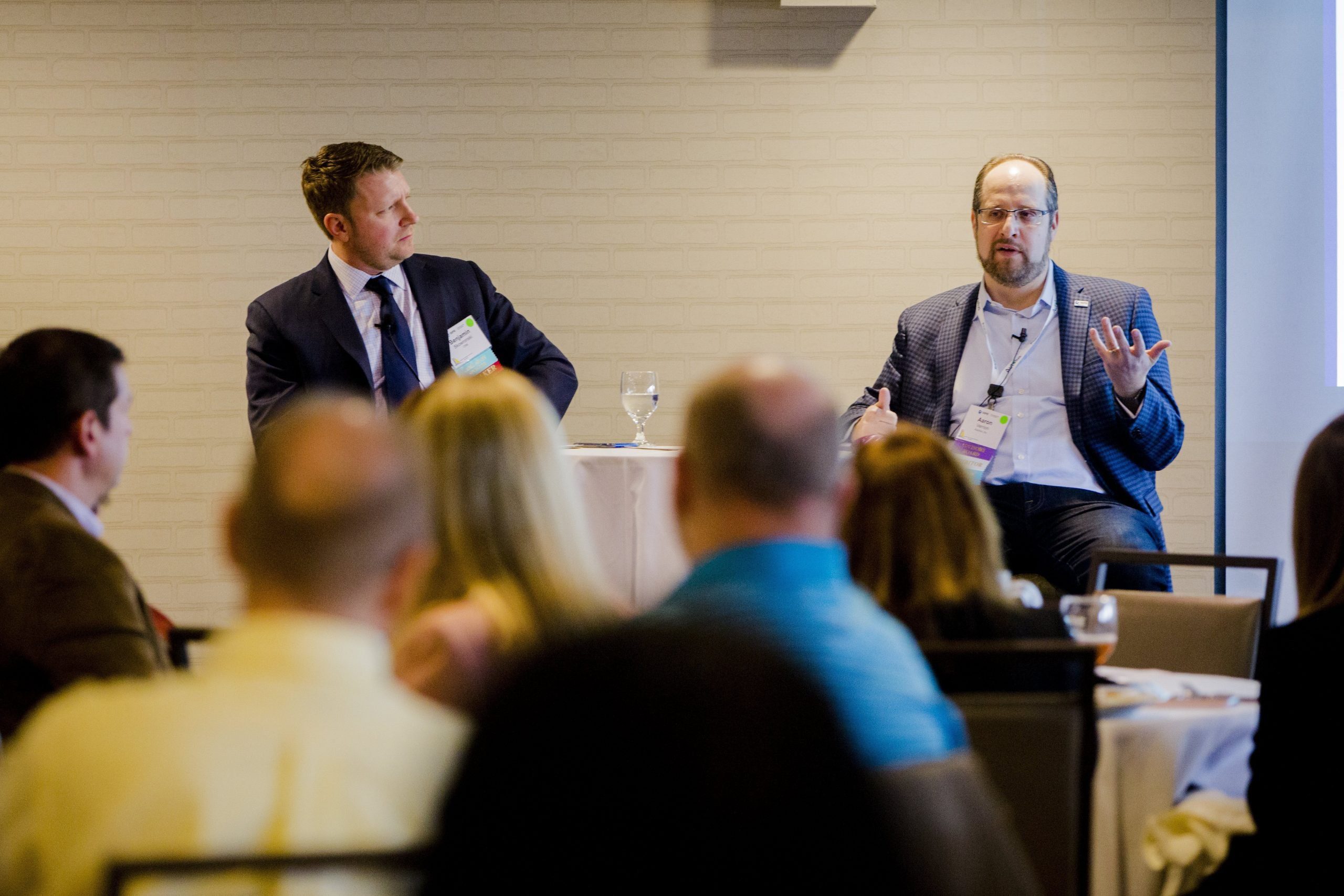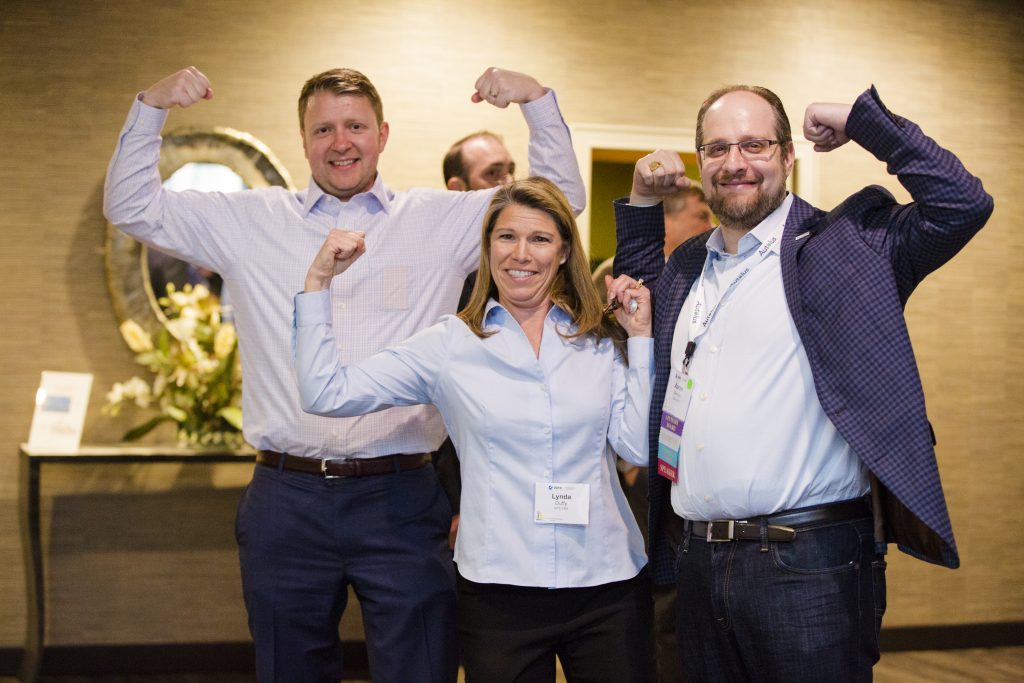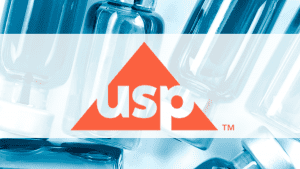
Autolus Therapeutics’ Aaron Vernon Delivers Inspiring Keynote Address on Impact of Cell Therapy Industry
April 3, 2019
The 2019 MAST Showcase, hosted by the International Society for Pharmaceutical Engineering – Chesapeake Bay Area Chapter (ISPE-CBA), kicked off this year’s event with an inspiring keynote address by Aaron Vernon, VP Engineering & Supply Chain at Autolus Therapeutics, a leading CAR T-cell therapeutics company.
Early on in his keynote, Vernon connected his work at Autolus and across his career to his own personal, familial experiences with cancer care, drawing in the audience with a gentle reminder about the energizing “why” underpinning the BioHealth Capital Region’s quest to be Top 3 in 2023.
“The BioHealth Capital Region is rapidly growing and we all share a common ‘why’– everything we’re all doing is for the greater good”, stated Vernon.
The rapidly growing CAR T-cell therapy space has only two products in the market yet hundreds of CAR T focused companies are registered on Clinicaltrials.gov.
The cell and gene therapy market, as noted by ISPE-CBA President and keynote moderator Ben Skowronski, has exploded from $3.8B in 2015 to a potential $23B by 2024. This huge leap is driven by the remarkable potential for personalized medicine to provide more targeted treatments, shorter development timelines and faster delivery of
These therapies are poised to disrupt the industry in a major way.
Vernon likened this industry to the “Front-line” of translational innovation, where processes and the rules of engagement are being learned on the fly and then standardized.
For cell and gene therapies, Vernon added, GMP begins the moment a sample gets drawn from a patient and reaches the bag, starting what he called a “vein-to-vein” cycle time. Vernon explained that this “vein-to-vein” process–where samples get collected from the patient, shipped to Autolus for manufacturing and sent back to the patient within approximately a month — is a radical departure from the more traditional biotech GMP processes where large batches with longer lead times are the standard.
For companies like Autolus, manufacturing and delivery logistics operate on
Because CAR T-cell therapies are made-to-order, stated Vernon, inventory management is highly challenging and production facilities need to pivot quickly to meet changing patient needs. The challenge for gene and cell manufacturing is in “scaling out” not in “scaling up”, said Vernon, noting an important difference from traditional biotech manufacturing.

Driven by open processing, benchtop
“We’re doing something at Autolus that’s never been done before. It’s like a capstone project,” said Vernon. The BioHealth Capital Region as an ecosystem will have to “learn on the fly” as well about how it can evolve to best support its rapidly growing cell and gene therapy industry.
Cell and gene therapies, in general, are labor intensive, higher risk from a manufacturing standpoint and have a more complex, retail-like supply chain approach that’s unique in the industry. That said, as CAR T therapies mature and challenges are overcome, its potential to change patient lives is undeniable.
CAR T and other cell and gene therapies offer highly targeted, personalized therapies that could eventually reduce the need for “carpet bombing” treatments like chemo. In addition, these therapies could eventually reduce cost-of-care impacts on therapy pricing.
Challenges remain, however. Vernon noted that Autolus’ advanced automation technology is critical to reducing risk and costs.
Manufacturing capacity is an ongoing challenge for biotech companies globally. You will start to see more companies build their own facilities to bridge the capacity gap and they will look to site their facilities in the areas that can best support their ongoing operations with the right infrastructure and workforce. Vernon is highly confident that regional partnerships and collaborations with groups like ISPE will build an environment in which companies like Autolus can thrive in this region.
“It sounds counterintuitive to go where our competition is, but we believe the BioHealth Capital Region is where we can build talent at scale. There’s approximately 2,000 jobs coming to the area. We’re all going to have to come together to make this work,” said Vernon.

Vernon is leading the Autolus team that is building out the new manufacturing and U.S. headquarters site in Rockville, MD that will house over 170 people and is expected to be completed by 2021. The U.S. headquarters is currently housed in Rockville, MD but will move once the new building is complete.
The project is emblematic of the BioHealth Capital Region’s growth within the cell and gene therapy space.
“Autolus chose to build in Montgomery County for a variety of reasons,” said Vernon.” With the scientific and engineering talent in the area and the strong University and College system, we knew this was the right place. The BioHealth Capital Region is now the hotspot for cell and gene therapy manufacturing.”
The keynote lunch came full circle with Christine Lederer of Zaching against Cancer Foundation addressing the audience that was clearly moved by her story. Her son, Zach, started the Zaching for Cancer movement before he passed away at the age of 20 from a brain tumor, and now the organization provides support for hundreds of cancer patients each year.
Vernon’s keynote kicked off MAST 2019 with a clear call-to-arms for regional and interdisciplinary collaboration that can uplift the entire BHCR and the patients it so passionately serves.

Ben Skowronski, Lynda Duffy & Aaron Vernon – showing their ‘Zaching against Cancer’ pose at MAST 2019.
- About the Author
- Latest Posts
Steve brings nearly twenty years of experience in marketing and content creation to the WorkForce Genetics team. He loves writing engaging content and working with partners, companies, and individuals to share their unique stories and showcase their work. Steve holds a BA in English from Providence College and an MA in American Literature from Montclair State University. He lives in Frederick, Maryland with his wife, two sons, and the family dog.





